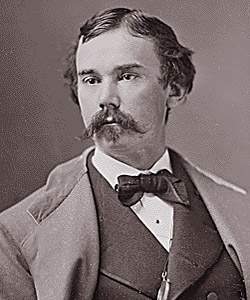John Milton Hay (American National Biography)
Scholarship
Hay did not find academic life at Brown stimulating but was attracted to the literary circles of Providence and found it difficult to return to the Illinois prairie, where he read law with an uncle in Springfield and was admitted to the bar in 1860. He took a small part in the presidential campaign of Abraham Lincoln and went to Washington as one of Lincoln's personal secretaries. Technically he was a Pension Office clerk. In 1864 he was commissioned as a major and assistant adjutant general in the volunteers. In 1865 he was promoted to colonel, although he never served actively in the military, being deputed to the Executive Mansion. He left Washington in May 1865 following Lincoln's assassination but retained his military commission until 1867. Initially unimpressed with Lincoln, by 1863 Hay had come to consider him the indispensable leader. Lincoln influenced Hay's social and political thought significantly.
Following the Civil War, Hay secured minor diplomatic posts in Europe, serving as secretary of the American legation at Paris (1865-1866), secretary and chargé d'affaires ad interim at Vienna (1867-1868), and secretary at Madrid (1869-1870). He conducted no serious diplomatic work and devoted his time to becoming acquainted with European culture. His democratic beliefs also matured in these years, and he developed a loathing for European autocracy.
Following the Civil War, Hay secured minor diplomatic posts in Europe, serving as secretary of the American legation at Paris (1865-1866), secretary and chargé d'affaires ad interim at Vienna (1867-1868), and secretary at Madrid (1869-1870). He conducted no serious diplomatic work and devoted his time to becoming acquainted with European culture. His democratic beliefs also matured in these years, and he developed a loathing for European autocracy.
Kenton J. Clymer, "Hay, John Milton," American National Biography Online, February 2000, http://www.anb.org/articles/05/05-00888.html.




